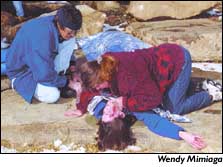|
Jan. 20, 2001 By Janelle Holden
A certain amount of risk is inherent in any wilderness outing ó avalanches, wild animals, rock slides, and even that tree root missed on the trail can injure a recreationist. So when help arrives at the scene, pray the victim is being treated by a certified Wilderness First Responder. "Since they could be hours or days from help, the interventions that Wilderness First Responders train in are even more aggressive than the ones EMTs train in because they have to be ó thereís no emergency room to back them up," explained Peter Muckerman, a Wilderness First Responder instructor who trained a class at Crow Canyon Archaeological Center this week. Muckerman led 18 potential first responders in exercises designed to integrate traditional trauma medicine with the demands of a wilderness setting. Many of the students who participated in the nine-day course are outdoor educators, guides, and just your run-of-the mill adventurers. Almost half of them live in Cortez, while others traveled from such locales as Rhode Island, Texas, and Boston. On Tuesday afternoon, the students role-played a situation where several members of the class pretended to have fallen down a 40-foot rock chute. Muckerman painted fake abrasions, scratches, and even blood running from their ears to create a more "realistic" situation. The class then checked vital signs and cared for the patients with an eye for every detail. Muckerman said the students were carefully evaluating their patients after making several mistakes earlier that morning. "Mistakes are tough teachers, but itís better than experiencing it in the field." The three aspects of wilderness medicine that set it apart from its urban cousin are aggressive treatment, protecting the patient from a harsh environment, and improvisation. Duct tape and safety pins can often play a significant part in the "improvisations." A Wilderness First Responder may be the only medic on the scene, and is charged with treating cuts, bruises, burns, and other pains and aches that are delegated to an emergency room in an urban situation. A Wilderness First Responder certification is good for three years, and currently costs $495 to complete. To re-certify, students complete a 2 1/2-day training. Muckermanís company, First Lead, is based in Telluride. |
||
|
Copyright © 2001 the Cortez
Journal. All rights reserved. |
